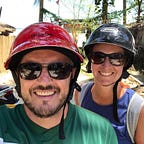Buenos días. Un café por favor.”
“Ciertamente, signor. Un memento.”
A short time later, as you continue people watching across the sunny plaza, writing in your journal, your coffee arrives. You are left with a sense of being proud of yourself for learning that bit of Spanish before leaving home. This is going to make your whole journey a lot smoother.
Whenever you are going somewhere new it is a great idea to learn a few words of the language. Not only will this make your journey easier, but also a lot more interesting. Less time struggling to understand each other. Fewer communication breakdowns and misunderstandings.
We all accept that people speak many different languages. That when we holiday overseas (if we are ever allowed to again) there will be different words for breakfast, bus station, and everything in between, that we need to navigate.
The chance to learn something new is embraced. We don’t declare that we won’t learn any of the new Spanish words as they are just “jargon”.
Now consider when organisations embark on an agile transformation journey. Something very popular over the last few years. The road ahead is long. There will be a lot of stumbling blocks. Many learning opportunities.
And, importantly, there is a new language to learn. New words for things you may not be familiar with. There will be some translation required to continue on the journey.
With this in mind, why do we resist this in the workplace? Suddenly, the new words are “jargon”, rather than what something is actually called. People suddenly get an aversion to “labels”.
“I’d rather not call that person the scrum master. Or that meeting the backlog refinement.”
“OK, tell me more.”
“Well, I don’t see why we have to label these things.”
That we used to be very happy calling someone the project manager. Or a bit of paper with coloured dots on it, the status report, seems very curious to me. Is that not us doing the very thing we now have an aversion to, attaching labels to things?
So what drives this curious behaviour often seen in the organisations we work with? Could it be a sense of vulnerability? That people don’t know what the future looks like so they cling on to the past? That us humans don’t like change so we try and hold on to what makes us comfortable?
Or is it that the dawn of a new way of working often ushers in the need to change the system that supports the work, and how we subsequently show up in that system?
Pushing decisions down to the lowest levels. Empowering teams. Leaders becoming coaches. People have to unlearn old behaviours, learn new ones, then embed them. Create new habits. Unfreeze, Change, and Refreeze, to quote Kurt Lewin, and his change model (1951), published many years ago but still widely used in change management.
If we look at it through the lens of David Rock’s “SCARF” framework (2008), perhaps people sense losing their status and a lot of certainty. This would certainly explain why some people resist the change. What got them here, won’t get them there, and this is scary for a lot of people.
And how many leaders are willing to role model vulnerability? To see it in the same way that Brené Brown (2012) does, as a strength.
Having an experienced coach who can partner with people as we traverse these tricky waters will help. A coach who can act as a translator, supporting everyone as they slowly learn snippets of the new language. As they start getting more fluent in the new world. Slowly transitioning from new ways of working, to plain old ways of working.
I’d love to hear your thoughts, and your experience with this.
In the meantime, I need another coffee.
“Signor, un café más, por favor.”
Works Cited
Brown, Brene. Daring Greatly: How the Courage to Be Vulnerable Transforms the Way We Live, Love, Parent and Lead. Penguin, 2012.
Lewin, Kurt, and Dorwin Cartwright. Field Theory in Social Science. Harper, 1951.
